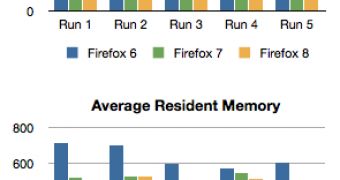Firefox 7 is officially out. If you're a Firefox user, you should be getting the updated version soon, if you haven't already. You can also grab it from the download links below. Mozilla's biggest selling point for Firefox 7 is improved memory usage.
It says that memory usage drops by 20 percent, 30 percent and even 50 percent in some situations. But those figures come from a few tests done when Firefox 7 was still in development.
Now Mozilla has more figures and charts that back up its claims that Firefox 7 is the most efficient Firefox to date.
"Mozilla engineers started an effort called MemShrink, the aim of which is to improve Firefox’s speed and stability by reducing its memory usage. A great deal of progress has been made," Mozilla wrote.
"The newest update to Firefox is the first general release to benefit from MemShrink’s successes, and the benefits are significant," it said.
Measuring memory use is rather hard. Apart from the fact that there is no standard way of doing it or widely accepted benchmarks, users run Firefox in very different ways, with different websites and apps, not to mention extensions.
This is why memory usage in Firefox 7 will vary from user to user. Still, there are several cases where users should notice the improvements easier.
Those that run Firefox for a long time will see the benefits of the improved garbage collection and the efforts to reduce memory fragmentation. Memory usage should rise less with time.
Users that have a lot of tabs open at the same time, meaning tens of tabs or more, will also clearly see the improvements.
Mozilla also notes that web pages with large amounts of text will consume less memory. Firefox on Windows performs better and the browser should feel snappier if you have small amounts of free memory available, due to other software eating up memory or simply because your computer is older.
Mozilla has done several tests to showcase the improvements, with the caveat that real world effects will vary.
During a set of 'endurance tests,' in which a large number of sites are open and then closed, Firefox 7 showed a clear improvement (the first chart) in memory usage compared to Firefox 6. Firefox 8 shows an even bigger improvement since Mozilla is still working on optimizations.
The second chart shows memory usage in time for Firefox 6 (above) compared to Firefox 7 (below). Compare only the purple lines which indicate resident, i.e. actual physical, memory used. In another set of tests, MemBench was used.
"For Firefox 6, the peak resident usage was 2,028 MB and the final resident usage was 669 MB. For Firefox 7, the peak usage was 1,851 MB (a 8.7% reduction) and the final usage was 321 MB (a 52.0% reduction). This latter number clearly shows that fragmentation is a much smaller problem in Firefox 7," Mozilla detailed the results of the MemBench test in one occasion.
The synthetic benchmarks are encouraging, but they don't tell the whole story. Still, Firefox 7 users should be finding it snappier than before on their own.
And they can also help Mozilla track real-world memory usage by enabling the telemetry feature, which sends anonymized, per-session performance data back to Mozilla to be analyzed in the hope of making Firefox even faster and slimmer.
Firefox for Windows is available for download here. Firefox for Linux is available for download here. Firefox for Mac is available for download here.

 14 DAY TRIAL //
14 DAY TRIAL // 
